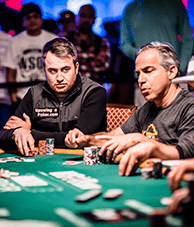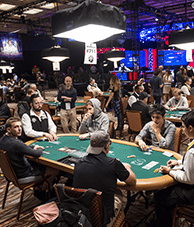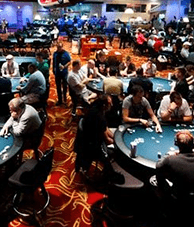Key points on Poker Tournaments and Strategies

Poker tournaments are a form of playing the game using several tables. This distinguishes them from poker cash games which are usually played around a single table (however Sit & Go tourneys may also be played around a single table). Tourneys of this nature are renowned for being highly competitive in nature.
Key features of Poker Tournaments

Poker tournaments have a number of distinguishing features which differentiate them from other formats of playing the game. These include:
- The value of chips: The chips allotted to players do not represent their real value. They are also essential to a player remaining in the game since the individual will be eliminated once they run out of them.
- Payments: The payment you are allotted depends on how far you make it into the game. Players who make it into the top 10% can generally expect to partake in the prize.
Poker Tournament Strategies

Undertaking the necessary preparations before participating in a tourney is necessary to ensure you have a chance at winning big. And that means putting strategies in place to achieve that aim.
Below are a few helpful tips worth considering during a tournament.
- Get as many chips as possible early on: The start of a game provides the very best opportunity to amass more chips due to the large numbers of unskilled players present. Since they will be replaced (or rather whittled down) by skilled participants later on, doing so as the game progresses will become more difficult.
- Avoid Excessive Caution: New players participating in poker tournaments tend to be extremely cautious. While avoiding unnecessary risks is advisable, it is worth noting that exercising excessive caution not only makes it easy to be detected by more seasoned players, but also goes against the advice provided by poker professionals who actually encourage a bit of risk-taking.
- Focus on your stack size: This is particularly crucial at the beginning of the game. And even though it might be a bit tempting to observe players with larger stacks, working on getting as many chips as possible should be your main focus at this stage. The time to take a look at what other players are doing in order to be able to hold your own will come much later during the game.
- Take a few risks as the tournament progresses: One of the best opportunities to do so is during the middle stages of the tourney, particularly if you have succeeded in obtaining a significant amount of chips. However, it's worth noting that you may need to be a bit more prudent if you do not have a large number of them during this stage of the game. Playing this stage right will ensure you get to participate in the stage of the game known as being 'in the money' since all participants still able to play at that point will be rewarded with cash prizes.
- Be proactive under favorable conditions: One such example of this is when you happen to have the most chips in your possession. In this position, helping yourself to as many forced bets as possible is highly recommended. Another highly favorable circumstance is getting to play at the heads-up stage of a poker tourney. While players have been known to abandon the idea of a strategy at this stage, remaining focused will provide you with an edge over a rather complacent opponent.
- Practice makes perfect: In-depth studying, a bit of coaching are all essential to improving your skills. However, there is no substitute for experience. Hence participating in tournaments as often as possible is the best way to perfect your skills. Poker freerolls are also an excellent source of practice particularly since they provide an excellent opportunity to win real cash or attractive prizes without having to spend any money at all.









